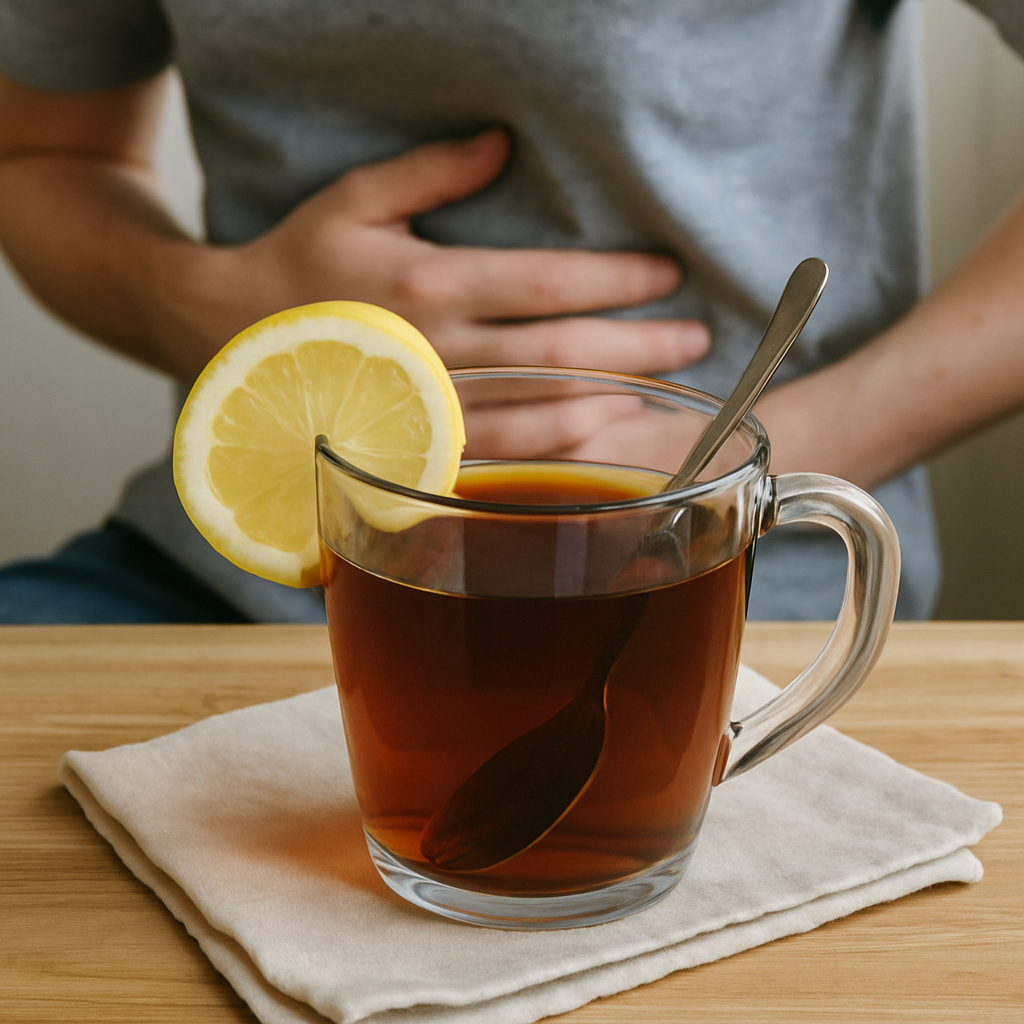Ask Ayurvedic doctor a question and get a consultation online on the problem of your concern in a free or paid mode. More than 2,000 experienced doctors work and wait for your questions on our site and help users to solve their health problems every day.
Is Lemon Tea Good for Loose Motion and Diarrhea?

Loose motion—also commonly known as diarrhea—isn’t just unpleasant; it can totally throw off your day (or even your whole week, honestly). When your stomach’s in revolt mode, you’re probably looking for something—anything—that might help calm things down. And you’ve probably heard people suggest lemon tea for loose motion or lemon water for diarrhea. But is lemon tea good for loose motion, really?
In this article, we’ll break down everything you need to know: why people turn to lemon tea during digestive upsets, how it works, and even how to prepare it properly. If you’re wondering “Can I drink lemon water in loose motion?” or “Will lemon tea stop loose motion?”, you’re in the right place.
Let’s sip our way through the facts, one cup at a time.
Can Lemon Tea Help with Loose Motion?
Why Lemon Tea Is Often Used During Loose Motion
First things first—what exactly is lemon tea, and why is it linked to diarrhea relief?
Lemon tea is essentially black tea or green tea brewed with freshly squeezed lemon juice. Sounds simple, right? But behind that citrusy zing is a mix of compounds—like antioxidants and mild astringents—that can actually play a role in soothing an upset stomach.
Loose motion is typically caused by infections, poor food choices, stress, or even allergies. During these times, your body needs hydration, mild astringents to help tighten things up (literally), and anti-inflammatory agents. And, guess what? Lemon tea checks a few of those boxes.
So yes, lemon tea is good for loose motion—at least in many mild cases.
Lemon Tea for Diarrhea: Ayurvedic Perspective
In Ayurveda, lemon is known for its cleansing and detoxifying properties. Tea, especially black tea, is seen as slightly drying and calming for the digestive tract. Combine the two, and you get a drink that can help balance excess “pitta” and “kapha” energies—both of which can go haywire during episodes of diarrhea.
Ayurvedic practitioners often suggest black tea with lemon for loose motion, especially when paired with light meals and rest. It’s not a miracle cure, but it’s a gentle nudge toward balance.

Don't wait or self medicate. Start chat with Doctor NOW
Benefits of Lemon Tea for Diarrhea Relief
Lemon Tea for Loose Motion: How It Works
Here’s the science-y bit (but we’ll keep it short, promise).
Lemon juice has citric acid, which can help flush out some pathogens, though it’s not a strong antibacterial. The black tea component contains tannins, which are known for their astringent properties. Astringents help “tighten up” the gut lining, reducing the frequency of bowel movements.
So when you’re stuck wondering, “can we drink lemon tea in loose motion?”—the answer is: Yes, in moderation, you defintely can. It won’t cure food poisoning or chronic gut conditions, but it may ease things up if you're having a rough time.
Can Lemon Tea Reduce Inflammation and Cramps?
Absolutely, to an extent.
Both black tea and lemon have anti-inflammatory compounds. This means that sipping on lemon tea during loose motion might actually help reduce abdominal cramping and intestinal inflammation. It’s not instant relief like popping a pill, but it's gentle, which can be exactly what your system needs when it’s already on edge.
Plus, the warmth of the tea itself is comforting. Hot liquids can help relax the digestive muscles, and that’s a small win worth having.

How to Prepare Lemon Tea for Loose Motion
When your stomach’s doing somersaults, the last thing you need is some complicated recipe. The good news? Making lemon tea for loose motion is super easy. With just a few basic ingredients, you can whip up a cup that might actually make you feel human again.
Let’s look at a couple of effective ways to prepare it.
Black Tea with Lemon for Loose Motion: Recipe
Ingredients:
-
1 cup water
-
1 black tea bag (or 1 tsp loose black tea)
-
Juice of half a lemon
-
Optional: a pinch of salt or a small spoon of honey (ONLY if needed)
Instructions:
-
Boil the water and steep your black tea for 3–5 minutes.
-
Remove the tea bag or strain the loose tea.
-
Add fresh lemon juice and stir.
-
Sip slowly while it's warm—not boiling hot.
Many people also ask, “Can black tea with lemon stop loose motion?” The answer? It might not stop it immediately, but it can help slow it down. The tannins in black tea, along with the mild acidity of lemon, work together to soothe and stabilize your gut. Just be careful not to overdo the lemon—it can be acidic on an already sensitive stomach.
Oh—and skip the sugar. It can worsen symptoms for some people.
Difference Between Lemon Tea and Lemon Water for Loose Motion
Let’s settle this one: lemon tea vs. lemon water—what’s better for diarrhea?
-
Lemon tea includes brewed tea leaves, which means you get tannins, antioxidants, and astringents. This makes it better for reducing the frequency of bowel movements.
-
Lemon water is basically just lemon juice in warm or room-temp water. It’s hydrating and refreshing but doesn’t contain those astringents that can tighten the intestines.
So if you're wondering, “can I drink lemon water in loose motion?”, the answer is yes. It’s good for hydration and provides a light source of vitamin C. But it won’t be as effective as lemon tea when it comes to calming things down internally.
That said, both have their place. Lemon water in loose motion can keep you hydrated and slightly energized, while lemon tea for diarrhea may help manage symptoms more actively.
And just a heads-up: if your body isn’t handling citrus well during illness (some people don’t), skip the lemon entirely. Opt for plain black tea or chamomile tea instead.
Conclusion
So—is lemon tea good for loose motion and diarrhea?
For many people, yes. It’s easy to prepare, gentle on the stomach, and packed with ingredients that can help soothe and settle your digestive system. Whether it’s lemon tea for diarrhea, or just black tea with lemon for loose motion, this simple drink has earned its place as a go-to home remedy.
But like with anything, moderation is key. Too much lemon or strong tea can backfire. And if your symptoms persist for more than a couple days, it’s best to see a doctor rather than rely on home remedies.
Ultimately, a warm cup of lemon tea won’t fix everything—but sometimes, it’s a really good start.
FAQs
Can black tea with lemon stop loose motion?
It’s not exactly a cure-all, but black tea with lemon for loose motion can definitely help. The tannins in black tea tighten intestinal tissues, and the lemon adds mild antiseptic and detoxifying properties. Together, they might slow down the frequency of bowel movements and give your gut a break.
That said, if the cause of your diarrhea is bacterial, viral, or due to a food allergy, this tea won’t “stop” the problem entirely—it just helps ease the symptoms. If you notice blood, fever, or dehydration, stop sipping tea and call your doctor. Seriously, don’t mess around with severe symptoms.
How many times can we drink lemon tea in a day for diarrhea?
For most people, 1 to 2 cups of lemon tea per day is enough while you’re dealing with loose motion. If your stomach is already sensitive, drinking too much tea or citrus could make it worse.
Also, spacing out the tea is a good idea. Don’t chug it all at once like it’s Gatorade. Sip it slowly, and let your gut decide if it wants more. Some folks swear by having one cup in the morning and another in the evening—but you know your body better than anyone.
If things start to feel worse instead of better, stop and try plain tea or switch to something non-citrusy.
Will lemon tea help with stomach cramps during loose motion?
It might. While lemon tea in loose motion isn’t a magic bullet, its warmth can be soothing to stomach muscles, and both lemon and tea have light anti-inflammatory properties. The tea helps relax the digestive tract, while lemon may help clear out mild toxins or lingering junk in the gut.
Just don’t add too much lemon—it’s acidic, and if you’re sensitive, it could make cramping worse. Go light, test your tolerance, and adjust.
Final Thoughts
Loose motion is uncomfortable, sure. But with simple remedies like lemon tea, you don’t always need to sprint to the pharmacy right away. Home treatments like these have been around for generations—because sometimes, they just work.
If you found this article helpful, share it with friends or family who might be looking for natural remedies. You never know when someone else could use the info.
Have your own go-to recipe for lemon tea for loose motion? Or a different trick that’s worked wonders for you? Drop a comment, share your tip, or join the conversation online. Sometimes the best remedies come from the people around us.
And hey—next time your stomach rebels? You’ll be ready. One lemon, one tea bag, and a little patience. That’s all it takes.
So, to wrap it all up:
-
Is lemon tea good for loose motion and diarrhea? Yes—when used wisely, it can help.
-
Can we drink lemon tea in loose motion? Absolutely, but not excessively.
-
Lemon water for loose motion? Good for hydration, but not quite as effective as lemon tea for gut symptoms.
Keep it simple, keep it gentle, and listen to your body. If lemon tea works for you, great. If not, there’s always chamomile... or a good nap.
Stay hydrated, stay curious, and feel better soon. 😊

